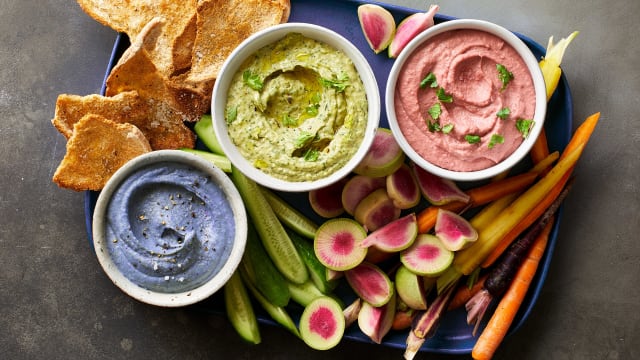Tricks to Stop Stress Eating

“Don’t stress.” We often hear this refrain from those who wish us well. It is understood universally that we may be prone to stress — from meeting work deadlines, to planning the perfect vacation, or when trying to manage online schooling. Stress has been a part of our lives, and its presence got further underlined over the pandemic as we worried about our health, work, and finances. Young people, in particular, are suffering from alarming increases in stress.
American Psychological Association’s annual "Stress in America" survey for 2021 found nearly one third of Americans (32%) were sometimes so stressed about the coronavirus pandemic that they struggle to make even basic decisions (e.g., what to wear, what to eat, etc.). Millennials (48%) were particularly likely to struggle when compared with their counterparts (Gen Z adults: 37%, Gen Xers: 32%, boomers: 14%, older adults: 3%); as were parents (47%) versus non-parents (24%).
The Deloitte Global 2021 Millennial and Gen Z survey also found that more than 41 percent of millennials and 46 percent of Gen Zers feel stressed all or most of the time. The pandemic has created much uncertainty and stress around millennials’ and Gen Zs’ financial futures. About two-thirds of each group agreed (to some degree) that they often worry or become stressed by their personal financial situations. Their families’ welfare was also a main cause of stress for millennials; uncertainty about jobs/career prospects was top for Gen Zs.
Stress experiences can be emotional – interpersonal conflict, unemployment, or loss of a loved one; they can be physiological – illness, drug withdrawal, or situational like meeting deadlines or managing work. A paper titled “The Impact of Stress on Body Function: A Review” published in 2017 defines stress -- “Any intrinsic or extrinsic stimulus that evokes a biological response is known as stress. The compensatory responses to these stresses are known as stress responses. Based on the type, timing and severity of the applied stimulus, stress can exert various actions on the body ranging from alterations in homeostasis to life-threatening effects and death.”
We combat stress in our own ways. For many of us, we try to soothe ourselves from stress with food. Eating becomes a handy distraction. “The nervous system is triggered, and it is a state that is very reactive. For people who can’t regulate stress in the body, they use food to soothe the nervous system. Food is often used as a distraction. When we are in flight- and- fight reactive state. The truth is that food doesn’t really calm us down, but it can be self-soothing habit,” says Round Glass mediation coach Lisa Kring.
Stress eating and emotional eating may involve binge eating of ‘pleasurable’ foods or high-calorie foods. This doesn’t bode well for a person’s physical health either. An article titled “Stress and Eating Behaviors” published in Minerva Endocrinol says in both human and animals, uncontrolled stress leads to a shift toward choosing more pleasurable and palatable foods. The foods eaten during times of stress typically favor those of high fat and/or sugar content. Repeating this pattern over time can lead to changes in the brain’s reward system that further enhance the cycle of food cravings and compulsive eating behavior. Poor eating habits that ensue may increase the risk of cancer, and cardiovascular and metabolic disease.
Mindfulness and S.T.O.P. to Combat Stress Eating
“Mindfulness may be the mental “seat belt” that protects us along the bumpy, twisting, turning road of life, whether we encounter unexpected drop-offs, terrible accidents, or smooth sailing,” write Susan L. Smalley and Diana Winston in their book, “Fully Present: The Science, Art, and Practice of Mindfulness.”
Strapping on this mental seat belt of mindfulness and being aware of what is affecting us can help deconstruct the issue of stress eating, and prevent its reoccurrence in our daily life. Kring says, “When people soothe themselves with food, what they are trying to do is calm their nervous system. If you can just stop and pause whenever you are out of balance and ask yourself ‘Am I stressed?’, you will give your body time to slow down, give yourself some space to understand there is a choice there.”
Mindful exercises that use breathwork can help in regulating stress eating. “Breath awareness can help you regulate the nervous system naturally – this effect is biological and neurological. There are ways to calm the nervous system especially using the S.T.O. P. system,” says Kring. The Mindful-S.T.O.P. method (mentioned below) is an acronym for a four-step approach to cultivate mindfulness anytime and anywhere.
“When you are stressed, it’s like having have tunnel vision, you are not thinking clearly. Before you reach out to eat or take another bite to soothe yourself, maybe you need calm down and ask yourself, ‘What do I need right now?’. But better still, you can try to understand and think a little more and ask what is causing the stress. Perhaps you can ask, “Do I need to leave this situation? Do I need to talk to a friend?’. Through mindfulness, you can really discover the most important need, and you realize you don’t need to eat.”
The S.T.O.P. Method
S: Stop what you are doing. Saying the word “Stop” to yourself can help interrupt habitual patterning and allow you to return to the present moment.
T: Take 3 deep breaths. This deep relaxation breathing helps induce instant relaxation effects.
O: Observe how your body is feeling, and what thoughts are going through your mind. Notice the sights and sounds around you as you breathe.
P: Proceed from a place of intention, with a gentle smile. Notice if smiling can relax your mind-body and facilitate wise choices.
Key Takeaways:
- Uncontrolled stress can lead to a shift toward choosing unhealthy foods.
- Stress eating patterns over time can lead to changes in the brain’s reward system, bonding relief to unhealthy eating practices.
- Mindful exercises that use breathwork can help in regulating stress eating.
- When feeling stressed, pause to ask your body what it needs.









